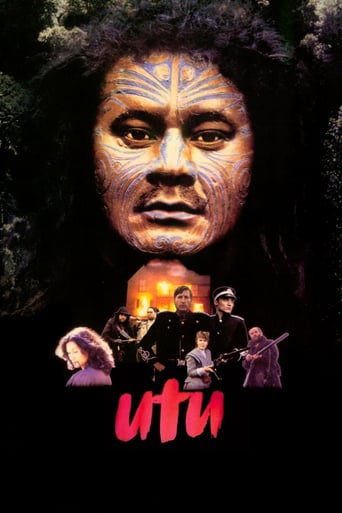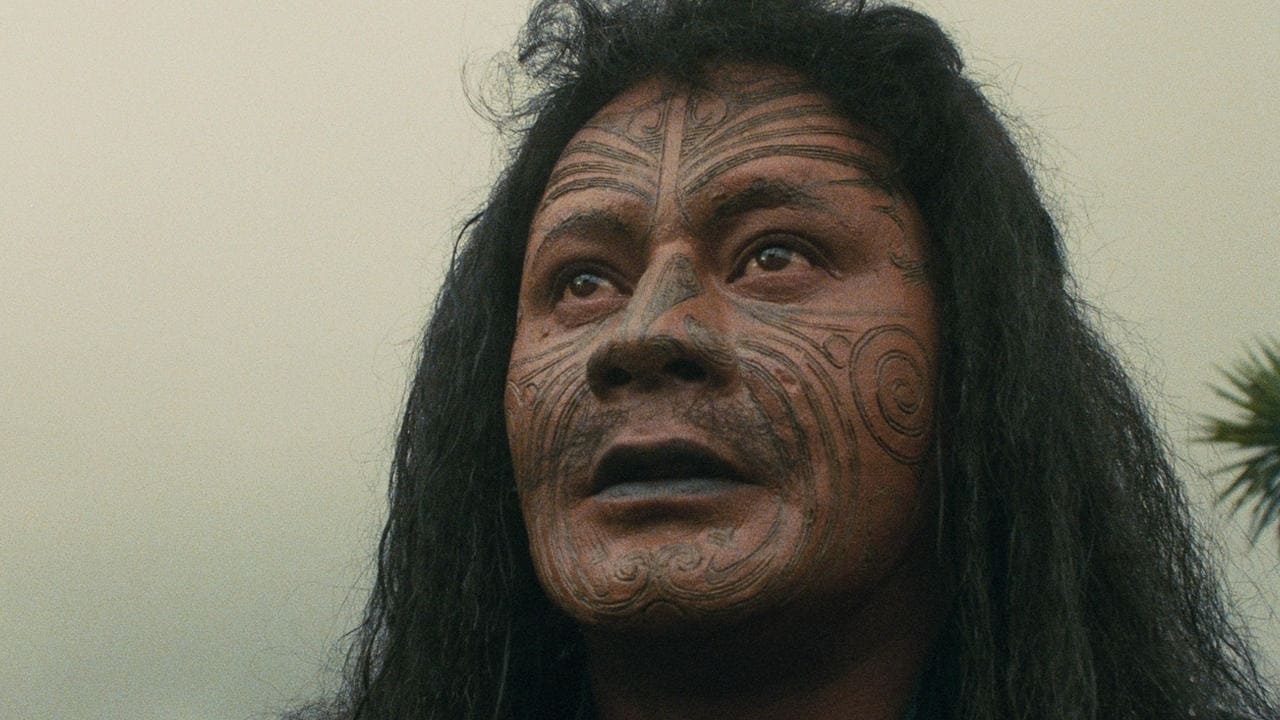mformoviesandmore
It is not too bad for an attempt at trying to make a movie that appeals to a wide audience as well as having a semblance of historical accuracy.But it is a bad movie when it come to script and character development. In those aspects it is very like a lesser Spaghetti western. It is even more like one in some of the scenes that are created, including the small town in an open plain.There is no decent music to carry the movie along. We also also don't get decent cinematography.Bruno's eventual development of quadruple barrel gun provides some light relief, along with the ingenious method of loading. And then his his next role in the movie is to fall asleep! A few other stereo-types are thrown in along with subtitled maori language in place of bad dubbing of Italian.At least they didn't make Utu 2.
sydneyswesternsuburbs
Director and writer Geoff Murphy who also created another classic flick, Under Siege 2: Dark Territory 1995 has created another gem in Utu.Starring Bruno Lawrence who was also in the classic television series, Frontline 1994-1997.Also starring Anzac Wallace who was also in another classic historical flick, Rapa Nui 1994.Also starring Tim Elliot who was also in an episode of the classic television series, Spyforce 1971-1973.I enjoyed the violence and the settings.If you enjoyed this as much as I did then check out other classic historical flicks, 300 2006, Apocalypto 2006, Ben-Hur 1959, Bodyguards and Assassins 2009, Braveheart 1995, Centurion 2010, Dersu Uzala 1975, Gladiator 2000, Ironclad 2011, Joan of Arc 1999, King Arthur 2004, The Last Emperor 1987, The Last of the Mohicans 1992, Lucky Country 2009, The Tragedy of Macbeth 1971, Mad Dog Morgan 1976, Mongol: The Rise of Genghis Khan 2007, The Musketeer 2001, Ned Kelly 1970, Pathfinder 1987, Pathfinder 2007, The Proposition 2005, Quest for Fire 1981, The Seekers 1954, Solomon Kane 2009, Spartacus 1960, Tristan + Isolde 2006, The Vikings 1958, The Dead Lands 2014, The 13th Warrior 1999, The Revenant 2015, Embrace of the Serpent 2015, Aguirre, the Wrath of God 1972, Viking 2016, The Naked Prey 1965 and The White Dawn 1974.
guypakeman
Utu is set during the Maori Wars of the 1850s and is the first contemporary film about this period in New Zealand history, although it definitely shows the influence of Rudall Hayward's earlier epics. It set out on the difficult task of keeping historical accuracy whilst incorporating modern day sensibilities. Murphy's basic message, that by working together the Maori and Pakeha will succeed in forming a better New Zealand, has obvious inferences to the modern day racial tension; the film being released around the time of the controversial Springbok tour of 1981, which had led to widespread violence. This message, however, is by no means clear cut, and throughout the film we are shown the situation from many differing perspectives, 'the film's shifts in sympathy, and refusal to identify with one group, could be seen as honestly reflecting the national uncertainty. ' There are definitely many points of view and racial origins to be taken into account, and the main characters come to symbolise either their race, or a particular group, both in the historical context, and the modern equivalent. So by examining these characters more closely it is possible to understand the different ideas that Utu evokes. The two most extreme characters on either side are Elliott, the British officer, and Te Wheke, who becomes the leader of the Maori fighting against the British led troops. There were many Maori groups who were heavily involved in the production of Utu , lending credibility to the Maori characters. Initially our sympathies lie with Te Wheke, when he discovers a village of his tribe has been killed, and the powerful scene where he compares the colour of his hand first to that of a dead Maori, and then to the hand of the white soldier he has been alongside. It is at this point where his transformation begins, and is followed by the tattoo scene, again it is very powerful, and along with his army's dress, strongly echoes the style of the Maori gangs of the 1980s. However Te Wheke does not keep the audience's sympathies for long as he becomes ultra violent, even ordering the deaths of some of his own followers, and by the time of his trial many characters are seeking 'utu' against him. Te Wheke is however not made to be a representative of the Maori; he is 'largely disowned by the race that produced him .' So, if Te Wheke is to blame on one side, it is clearly Elliott who shoulders the responsibility on the other. His extreme racism is reinforced throughout the film, from his condescending treatment of the Maori fighting on his side, to the continual, and it is assumed deliberate, mispronunciation of Te Wheke's name. Scott, on the other hand, the other main white character, himself a colonial, is, along with Wiremu, portrayed as an ideal New Zealander. Reid however takes a more cynical view of this, 'as Utu tells it, the increasingly easy-going Kiwi joker Scott, with his love for Kura, is free of any racist taint; while the pommie officer is a racist bastard. Which is very flattering for any Kiwi jokers watching the film. ' Whether this view of the British as opposed to the colonials is entirely accurate is questionable and the apparent desire not to attach anything negative to white New Zealanders isn't really in keeping with what might be expected, but is probably what the audience at home would have wanted. Wiremu is the character that is portrayed as the 'good' Maori, in stark contrast to his brother Te Wheke. If the main thrust of Utu is indeed to 'explore the subversive idea that Maori and Pakeha have more in common with one another than with the British ' then the character of Wiremu is a vital one. It is he who kills both Elliott and Te Wheke, the two most extreme characters, and he is well educated and willing to work alongside the British, seemingly for the good of the country as a whole. Disappointingly, we do not get much of an insight into his personality, and although his actions are memorable, such a complex character becomes, 'the most maddeningly under-developed character in the film. ' Utu was the first major New Zealand film of the 80s to tackle the issue of race, and whilst its setting is an historical one, its release came at a very difficult time for race relations in New Zealand. It has been criticised for being over complicated and not identifying more strongly with one point of view. Despite these negative comments, Utu is still very important in terms of how race is portrayed in New Zealand films, and, back in 1982, really brought the Maori into the consciences of movie-goers and filmmakers alike.
mattkratz
This movie might remind you of "Dances With Wolves." I enjoyed it, and thought it gave a good insight into Maori history and culture.Leonard Maltin gave it a less-than-appealing review while another book loved it. I rank it more in the middle and more towards the "other book" with the second half redeeming it.If you are into something different, try out this New Zealand western. I am a HUGE fan of kiwi actor Bruno Lawrence (Williamson in this film). I recommend it.*** out of ****


 AD
AD



